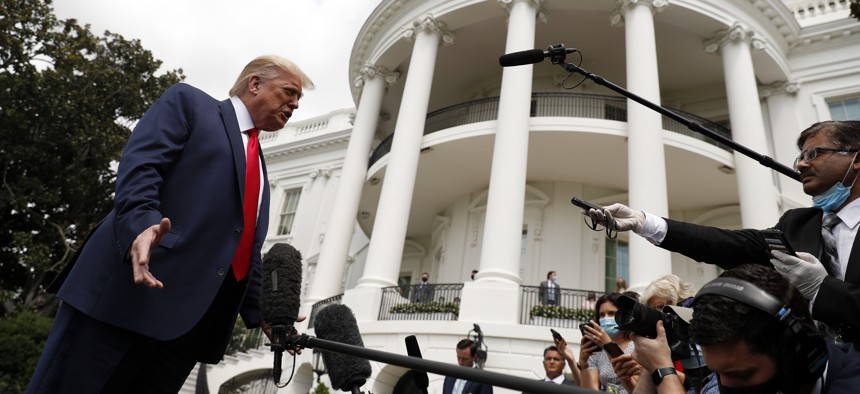Trump Looks to Executive Orders as Coronavirus Aid Talks Falter

President Donald Trump speaks with members of the media before boarding Marine One on the South Lawn of the White House in Washington, Thursday, Aug. 6, 2020, for a short trip to Andrews Air Force Base, Md. and then on to Cleveland, Ohio. AP Photo/Andrew Harnik

Connecting state and local government leaders
The president said he would issue executive orders to provide some temporary coronavirus relief if Democrats and White House negotiators are unable to come to agreement over a broader aid package. But it remains unclear how he can authorize spending without Congress.
With White House negotiators and congressional Democrats unable to reach an agreement Friday on funding for state and local governments and federal unemployment insurance as part of a coronavirus aid package, President Trump said he would issue executive orders to provide some form of temporary aid.
At a news conference Friday night, Trump said he would issue executive orders to implement a payroll tax holiday through the end of the year, defer student loan payments indefinitely, extend a moratorium on evictions, and extend federal unemployment benefits through the end of the year.
Trump provided no details on the orders, including the amount of unemployment benefits to be paid weekly, and did not indicate when they would take effect. The president cannot spend money without the approval of Congress, so it was unclear how some of the initiatives would be paid for. Trump said he "had the money" to cover unemployment benefits but declined to say how much supplemental aid he is poised to offer out-of-work Americans.
Asked about the legality of the orders, Trump said he expected the same type of lawsuits over the orders as he has faced for other executive action taken during his term.
Earlier in the day, White House negotiators said talks over a broader coronavirus aid package had stalled. Treasury Secretary Steven Mnuchin said he would advise Trump to issued orders as a stopgap measure while negotiations on a broader bill continue.
“People have run out of enhanced unemployment so that is something we will recommend an executive order on,” Mnuchin said as he and White House chief of staff Mark Meadows emerged from a meeting Friday afternoon with House Speaker Nancy Pelosi and Senate Minority Leader Chuck Schumer.
“It will take a little bit of time for us to finalize these and process them, but we will do them as quickly as we can because the president wants action," Mnuchin said.
Going into Friday's meeting, Democratic leaders described the roadblocks they faced in coming to an agreement, with Pelosi indicating the White House had not been open to her suggestion to split the different between the $3 trillion aid package that House Democrats passed in May and Senate Republicans’ $1 trillion aid proposal.
“They said ‘absolutely not,’” Pelosi said.
After the meeting, Mnuchin highlighted two sticking points where he said Democrats have not been willing to budge on a broader bill—the $915 billion they want to provide state and local governments and an extension of the $600-a-week federal unemployment benefits.
“If we can reach an agreement on state and local and unemployment, we will reach an overall deal," he said. "And if we can’t, we can’t.”
The details of the executive orders were unclear Friday, but Schumer noted that they would have to remain fairly narrow in scope so as not to be an overreach of the president’s legal authority. Schumer was critical of reliance on standalone executive orders, calling them “totally inefficient” to address Americans’ needs amid the ongoing pandemic and noting that the president cannot spend money without the approval of Congress.
“The biggest problem is not what they do but who they leave out,” Schumer said, noting that neither schools nor state and local governments were included in the suggested orders.
With the number of Covid-19 infections continuing to rise, businesses have struggled to reopen and rebound, and millions of workers continue to be unemployed.
The United States added 1.8 million jobs in July, but that’s far fewer than the more than 6 million jobs added in May and June, according to a Department of Labor report out Friday. Fewer than half the jobs lost in April have been recovered, and while the unemployment rate declined to 10.2% this month it still exceeds the highest rate it hit during the Great Recession.
While both Mnuchin and Meadows expressed frustration over the inability to reach a deal Friday, they indicated that they would be open to continued negotiations with Democrats.
Andrea Noble is a staff correspondent with Route Fifty.

NEXT STORY: New York Attorney General Seeks to Dissolve National Rifle Association




